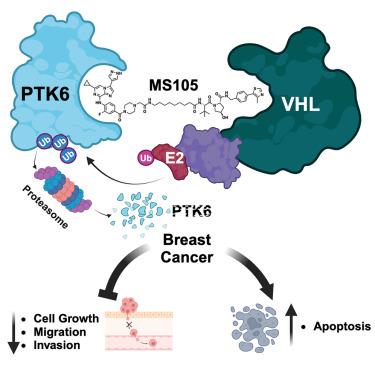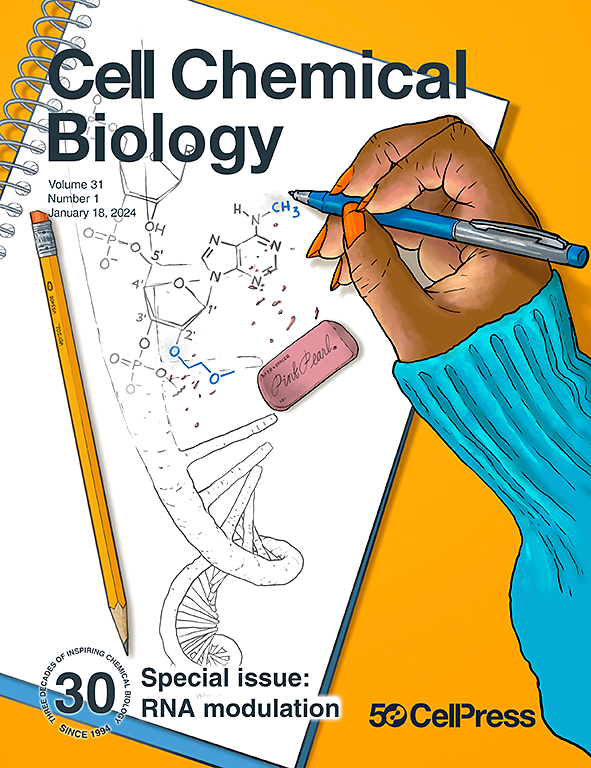一种 PROTAC 降解剂可抑制 PTK6 的致癌功能,诱导乳腺癌细胞凋亡
IF 7.2
1区 生物学
Q1 BIOCHEMISTRY & MOLECULAR BIOLOGY
引用次数: 0
摘要
蛋白酪氨酸激酶 6(PTK6)是一种非受体酪氨酸激酶,是许多肿瘤类型的致癌驱动因子。然而,目前还缺乏针对 PTK6 的治疗药物。虽然已经开发出了几种 PTK6 激酶抑制剂,但没有一种得到临床应用,这可能是由于激酶的非依赖性功能影响了它们的疗效。PTK6激酶抑制剂治疗可表征PTK6下调的某些效应,但不是全部效应。PTK6下调可抑制乳腺癌细胞的生长,但使用PTK6激酶抑制剂治疗则不会。为了通过化学方法下调PTK6,我们设计了一种PROTAC--MS105,它能有效且特异地降解PTK6。用 MS105(而非 PTK6 激酶抑制剂)处理乳腺癌细胞可抑制其生长并诱导其凋亡,与 PTK6(短发夹 RNA)shRNA/CRISPR 的效果相同。相比之下,MS105和PTK6激酶抑制剂都能有效抑制乳腺癌细胞的迁移,支持了PTK6致癌功能的不同激酶依赖性。我们的研究支持将 PTK6 降解剂作为靶向 PTK6 的首选方法。本文章由计算机程序翻译,如有差异,请以英文原文为准。


A PROTAC degrader suppresses oncogenic functions of PTK6, inducing apoptosis of breast cancer cells
Protein tyrosine kinase 6 (PTK6), a non-receptor tyrosine kinase, is an oncogenic driver in many tumor types. However, agents that therapeutically target PTK6 are lacking. Although several PTK6 kinase inhibitors have been developed, none have been clinically translated, which may be due to kinase-independent functions that compromise their efficacy. PTK6 kinase inhibitor treatment phenocopies some, but not all effects of PTK6 downregulation. PTK6 downregulation inhibits growth of breast cancer cells, but treatment with PTK6 kinase inhibitor does not. To chemically downregulate PTK6, we designed a PROTAC, MS105, which potently and specifically degrades PTK6. Treatment with MS105, but not PTK6 kinase inhibitor, inhibits growth and induces apoptosis of breast cancer cells, phenocopying the effects of PTK6 (short hairpin RNA) shRNA/CRISPR. In contrast, both MS105 and PTK6 kinase inhibitor effectively inhibit breast cancer cell migration, supporting the differing kinase dependencies of PTK6’s oncogenic functions. Our studies support PTK6 degraders as a preferred approach to targeting PTK6 in cancer.
求助全文
通过发布文献求助,成功后即可免费获取论文全文。
去求助
来源期刊

Cell Chemical Biology
Biochemistry, Genetics and Molecular Biology-Molecular Medicine
CiteScore
14.70
自引率
2.30%
发文量
143
期刊介绍:
Cell Chemical Biology, a Cell Press journal established in 1994 as Chemistry & Biology, focuses on publishing crucial advances in chemical biology research with broad appeal to our diverse community, spanning basic scientists to clinicians. Pioneering investigations at the chemistry-biology interface, the journal fosters collaboration between these disciplines. We encourage submissions providing significant conceptual advancements of broad interest across chemical, biological, clinical, and related fields. Particularly sought are articles utilizing chemical tools to perturb, visualize, and measure biological systems, offering unique insights into molecular mechanisms, disease biology, and therapeutics.
 求助内容:
求助内容: 应助结果提醒方式:
应助结果提醒方式:


